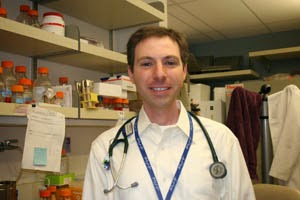Week 2 of 
Dr. Schiffman examined data in the Utah Population Database, a resource that links genealogies and cancer registry data from Utah to medical records and vital records. He found that when children were diagnosed with any kind of cancer at age 18 or younger, the risk to their siblings or children for childhood cancer doubled compared to families with no childhood cancer patients. If the child was diagnosed with cancer at age 4 or younger, the risk to close relatives for childhood cancer increased almost four times. Most of this increased risk to close relatives was found in those families who already had a strong family history of cancer.
Not to be alarmed, Dr. Schiffman urges families to use this information under cautious advisement. He notes that it simply places a stronger focus on ensuring that family history is collected and routinely updated for all pediatric cancer patients - even after they have completed treatment. Ensuring a family history is part of routine care can help clinicians refer appropriate patients for genetic evaluation. If a specific genetic risk factor is found, then at risk family members can undergo early tumor surveillance and ideally, improved outcomes.
Learn more about Dr. Schiffman's work.

Will my other kids get cancer? This is a common question that Joshua Schiffman, MD, hears when a parent learns that their child is diagnosed with cancer, but one, up until now - that he didn't have an answer for. Despite family history being a well-established risk factor in adult cancers, it is rather understudied in childhood cancers. Thanks to research funded in part by ALSF, Dr. Schiffman and his team have found that there is an increased risk for close family members of developing childhood cancer.
"It’s important to highlight that the absolute risk for family members is still very, very low! This study provides further evidence that origins of pediatric cancer may have a strong genetic component, given the increased familial risk, and this can provide hope for novel treatment and prevention strategies." - Joshua Schiffman, MD
Not to be alarmed, Dr. Schiffman urges families to use this information under cautious advisement. He notes that it simply places a stronger focus on ensuring that family history is collected and routinely updated for all pediatric cancer patients - even after they have completed treatment. Ensuring a family history is part of routine care can help clinicians refer appropriate patients for genetic evaluation. If a specific genetic risk factor is found, then at risk family members can undergo early tumor surveillance and ideally, improved outcomes.
Learn more about Dr. Schiffman's work.
September 9, 2014

